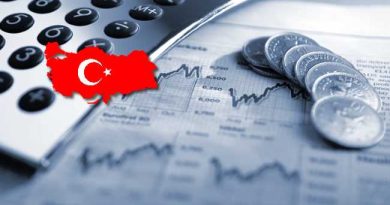Report: Economic Indicators of Turkey – November 2012
On October 9th, the Medium Term Program (MTP) covering 2013-2015 period was announced in Turkey.
The program, which sets out the Government’s plan for the macroeconomic framework throughout the next three years and also comprises 2012 year-end forecasts of main macroeconomic indicators, is prepared mainly under the assumption of a persistent presence of the downward risks surrounding the world economy.
During the three-year Program period, the annual average real economic growth rate of Turkish economy is estimated to be 4.7% and the economic growth is expected to be driven by mostly domestic demand. Besides, at the end of the program period, the unemployment rate is anticipated to decline to 8.7%, the current account deficit to GDP ratio to 6.5% and EU defined general government debt stock to GDP ratio to 31%. According to the MTP, the annual increase in CPI will be 5% in 2014 and 2015.
Current account deficit fell to its lowest level since November 2009. The current account deficit of August came in at $1.2 billion, well below the market expectations. On a monthly basis, the deficit is at its lowest level since November 2009.
In the first 8 months of the year, thanks to the ongoing contraction in the foreign trade deficit, the current account deficit narrowed by 33.4% to $36 billion compared to the same period of the previous year.
As of August, the 12 months cumulative deficit realized as $59 billion almost achieving the MTP’s 2012 year-end forecast of $58.7 billion. On the other hand, the improvement in the current account deficit is forecasted to lose pace in 2013 due to the expected revival in domestic demand.
CBRT continued to narrow the interest rate corridor.
Monetary policy of CBRT has been more supportive in recent months thanks to the diminishing risks regarding the current account deficit and inflation. In this respect, CBRT has continued to narrow the interest rate corridor in October. In the announcement following the Monetary Policy Committee meeting, it was noted that the re-balancing between domestic and external demand continued as envisaged and domestic demand has been following a moderate pace.
Fitch upgraded Turkey to investment grade
International rating agency Fitch upgraded Turkey’s long-term foreign currency rating from BB+ to BBB- with a stable rating outlook on November 5th.
For the first time since 1994, Turkey received investment grade. Fitch said “upgrade to investment grade reflects a combination of an easing in near-term macro-financial risks as the economy heads for a soft landing and underlying credit strengths including a moderate and declining government debt burden, a sound banking system, favorable medium-term growth prospects and a relatively wealthy and diverse economy.”
The recent upgrade has long been awaited by the markets. In fact, domestic markets have been decoupling positively from the fluctuations in global markets in line with the upgrade expectations in recent months.
In this context, the ISE-100 index has kept its rising trend since June and reached its record level of 72.529 points at the end of October. The yield on benchmark bond declined to 7.09% on October 31st.
Turkish Economy
The global macroeconomic framework of the Medium Term Program assumed that the recovery in global economic growth will be gradual while the growth rates in Turkey’s trading partners will be moderate and capital inflows to emerging market
economies will continue.
According to the MTP, the slowdown in Turkish economy continued in the first half of 2012 as a result of the uncertainties in global economy and the measures taken to avoid any further increase in the current account deficit. In the last one-year period, the increasing contribution of net exports to growth limited the negative impacts of the slowdown in domestic demand. In the last quarter of the year, however, the net exports’ contribution to growth is expected to fall whereas the contribution of domestic demand is anticipated to recover relatively.
Under these assumptions, Turkish economy is estimated to grow by 3.2% in 2012 and 4% in 2013. According to the Program, the growth rate would be 5% in 2014 and 2015 converging to its potential level. During 2013-2015, it is also predicted that the composition of growth will differ from that of 2012 in the sense that the contribution of net exports to growth will be limited while that of domestic demand will be the main source of growth. During this period, private consumption and investment expenditures, which were exceptionally weak in 2012, are expected to increase.
During the Program period, fiscal policy will be implemented in a way that macroeconomic stability will be improved, private sector driven growth will be prompted, and the fight with the current account deficit and inflation will be supported. The central government budget deficit to GDP ratio, which is forecasted to realize as 2.3% at the end of 2012, is expected to decline to 1.8% at the end of
2015.
When the estimates about the course of budget expenditures and revenues are taken into account, it is understood that the fiscal policy, in general terms, will continue to be prudent.
Expectations:
The composition of economic growth is expected to change gradually away from net exports to consumption and investmentexpenditures in the coming period. The expected enlivening in the domestic demand would support the increase in banking sector’s loan growth while decelerating the improvement in the current account deficit. CBRT, on the other hand, is expected to continue to make measured cuts in the upper band of the interest rate corridor.
18.11.2012
SOURCE: isbank.com.tr





